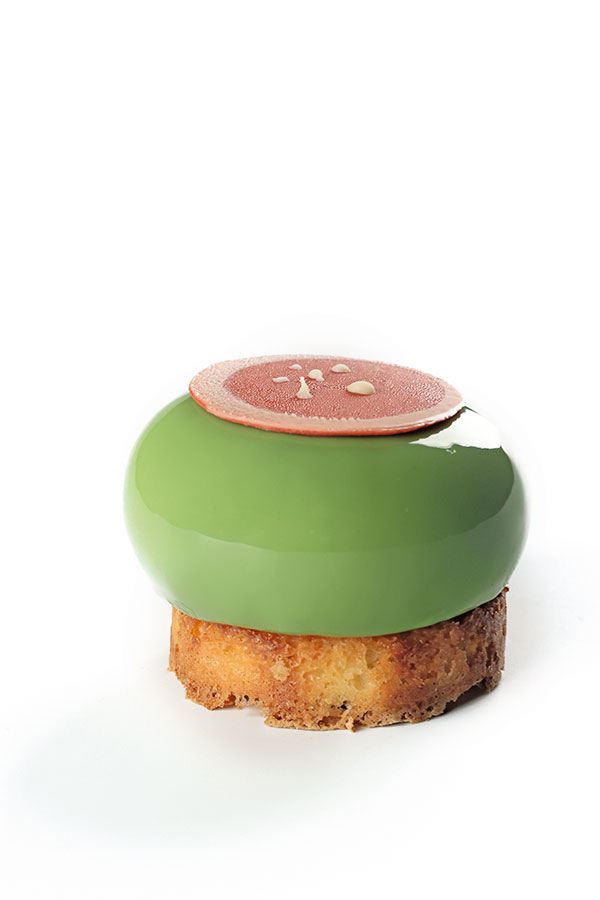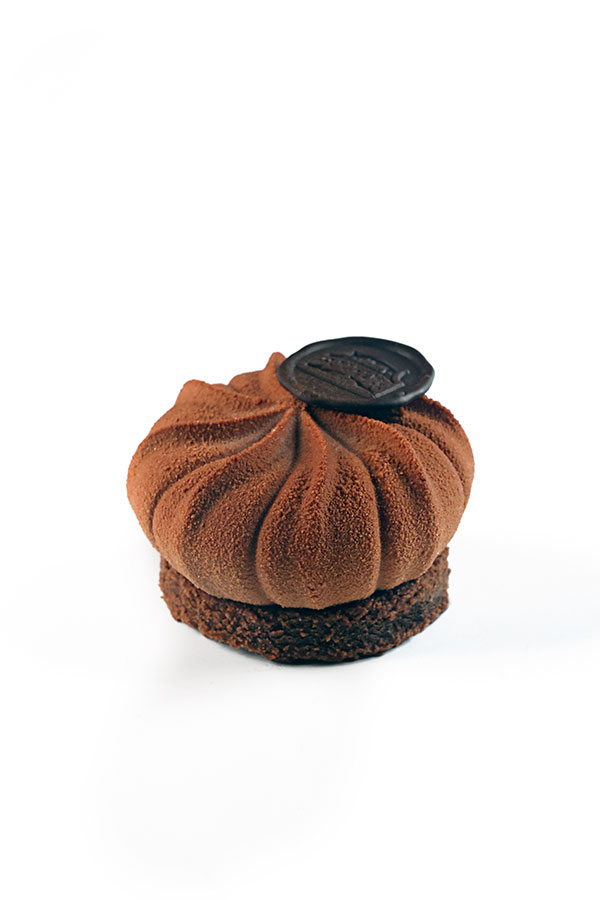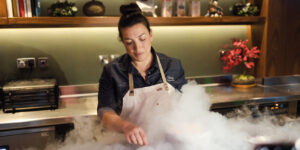Categories Pastry Chef Articles
María Evans: “Azú is one of the few bean-to-pastry bakeries in the world”
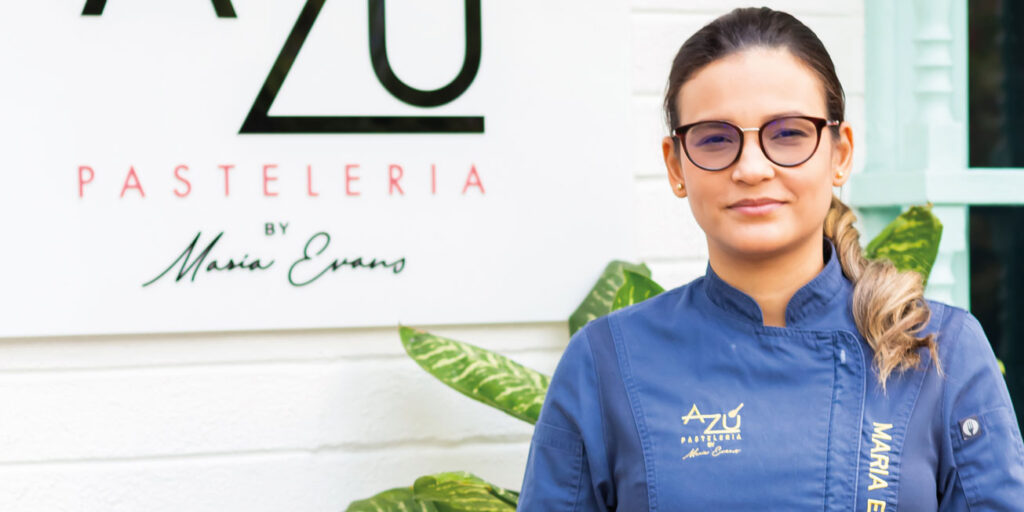
María Evans, from the Azú Bakery and Classroom in Caracas, has developed an intense and brilliant career in Venezuela, linking European-based pastry with the best local ingredients, and putting Venezuelan cocoa at the center of her discourse. Not only cocoa, but also copoazú, another 100% Amazonian theobroma that is part of the wide line of bean-to-bar chocolates she offers. Chocolates that become the protagonists of her pastry creations, what she calls “bean to pastry”.
In our Spanish pastry magazine Dulcypas, we spoke at length with the chef about the success of Azú and the pastry reality in Venezuela. We share some of her thoughts here.
How would you define Azú?
When I returned to Venezuela, I decided that I should make pastries with the techniques learned in Europe, but with local Venezuelan ingredients. That was when I contacted the Aboriginal Flavours Foundation and together we organized a gastronomic seminar in the Venezuelan Amazon rainforest. We spent two weeks with the indigenous people of Autana and it was there that I discovered one of the most interesting products I know, copoazú or theobroma grandiflorum, from which the name AZÚ comes. It represents what we are, a mix of well-made pastries with local ingredients.
In Venezuela there were no glazed desserts, there were no pastry shops selling macarons, so they asked us a question that would change many things. Do you teach courses? This is how we started in 2018 in the world of teaching, selling out dates after dates, first macarons, then desserts in the display case, pastries, bean to bar, and more. Currently it continues to be an important source of income. In 2019, we decided to expand by looking for a larger location. At the beginning of 2020, we got a wonderful location, so we rented it, without knowing that it would be one of the most complicated years for humanity. The pandemic arrived and the country was closed, it was not until November 2020 when we managed to halfway open, we only enabled half of the space while we adapted the back part where the classroom and the bean to bar laboratory are. Our first clients were people who had attended our courses, but a week later we had a queue at the entrance of the premises, which allowed us in a time of no more than six months to open 100% of the premises, resuming the courses and becoming one of the best bakeries in Venezuela and, in a certain way, a gastronomic reference in the country.
In short, Azú is a mix of avant-garde pastry with local ingredients. Our spaces are decorated with hand-made baskets by indigenous communities in our country.
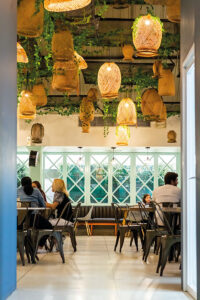
What range of products do you make and what are your most popular products in each family?
We make semi-frozen, the most popular ones are those with apple and tonka bean and with parchita (passion fruit). In pastries, the croissant with bean to bar chocolate cream is the best seller. In macarons, the one with cupuaçu and the one with túpiro and lemon ant. In the drinks section, a cappuccino with tonka bean. One of our strong points is that we make all the extracts for the coffee and pastry area, we work with natural ingredients from Venezuela.
We also have a savory menu and a brunch menu, where the tequeños are very popular, made with a semi-flaky dough and fresh cheese, as well as different sandwiches made at home such as avocado toast with eggnog on sourdough bread with cocoa shells. In the ice cream parlor, the copoazú ice cream stands out, which is also called the fruit of the seven flavors.
“Copoazú represents what we are, a well-made pastry mix with local ingredients”
How important is bean-to-bar chocolate to you? Are other “external” chocolates included in Azú?
Azú is one of the few “bean-to-pastry” pastry shops in the world; we don’t buy chocolate, we buy cocoa beans directly from local producers and we make our own chocolate. From a cup of hot chocolate to bonbons, semi-cold desserts, ice cream, everything is made with homemade bean-to-bar chocolate.
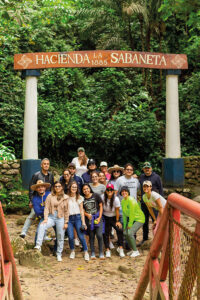
How is Venezuela doing today in terms of pastry and gastronomy? Is there movement?
In Venezuela, pastry shops, due to immigration many years ago, are mostly run by Portuguese and Italians who preserve the classic culture of these countries.
When we opened Azú, there were no bakeries with cutting-edge techniques. Thanks to the courses we have given and the chefs we have invited from other countries to give classes, we have helped raise the bar in Venezuela. However, there are very few bakeries that offer innovative or risky desserts in terms of ingredients and flavors.
“There are very few bakeries in Venezuela that offer innovative or risky desserts in terms of ingredients and flavors”
To what extent do you introduce very cutting-edge concepts at Azú, such as reducing sweetness and fat and adapting formulas to avoid certain ingredients?
Being a bakery with our own bean-to-bar allows us to create desserts with sugar-free chocolates. We sweeten the chocolate with freeze-dried banana, which has a higher percentage of fructose.
There are also other sugar-free options on our menu. And we don’t have a gluten-free section, but we do offer products made with alternative flours such as yuca flour, among others.
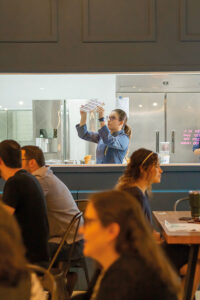
Are your clients ready for a more, let’s say, gastronomic product; that is, less of a sugar rush and more gastronomic pleasure?
The economic and political crisis we are experiencing has set us back even in the gastronomic field, but the country is moving forward thanks to businessmen, entrepreneurs, owners of establishments, and companies that have reinvented themselves or have seen the void in their trade. People and entities that have taken advantage of the crisis to offer solutions and be able to invest with fewer resources, generating a return on investment in the short term, as has been our case.
Since 2022, the country has experienced a resurgence of the gastronomic scene. Currently, there are Venezuelan restaurants recognized in the 50 Best. At the pastry level, I think there is still a lot to do. Even so, there is a need for diners to try new things, to demand quality, and local products and good workmanship are valued more.
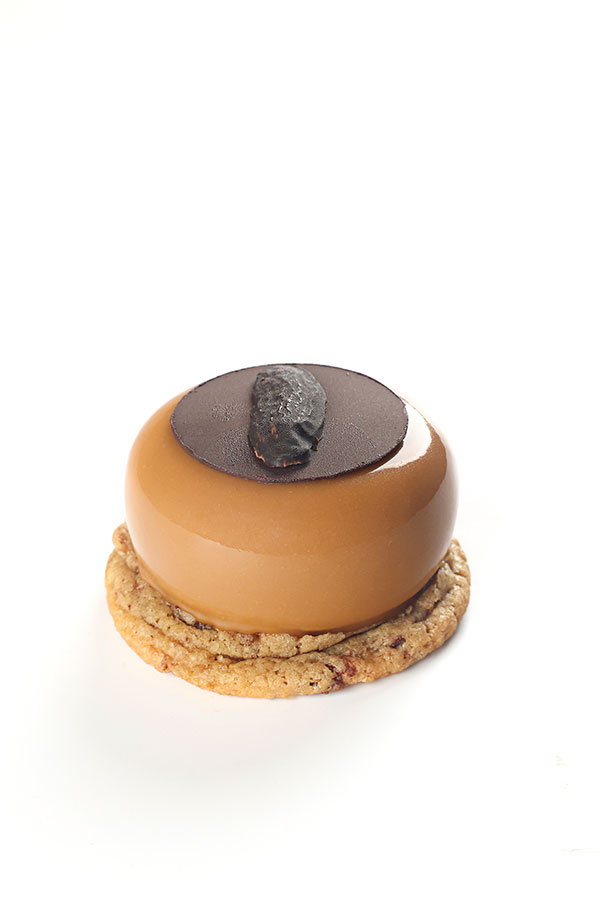
Sarrapia Tonka
